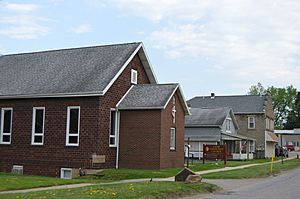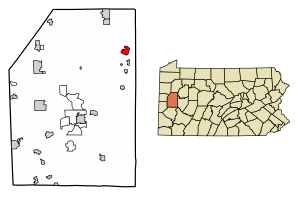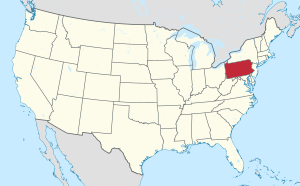Bruin, Pennsylvania facts for kids
Quick facts for kids
Bruin, Pennsylvania
|
|
|---|---|
|
Borough
|
|
| Borough of Bruin | |

Buildings on Main Street
|
|

Location of Bruin in Butler County, Pennsylvania.
|
|

Location of Pennsylvania in the United States
|
|
| Country | United States |
| State | Pennsylvania |
| County | Butler County |
| Settled | 1901 |
| Area | |
| • Total | 1.82 sq mi (4.73 km2) |
| • Land | 1.82 sq mi (4.73 km2) |
| • Water | 0.00 sq mi (0.00 km2) |
| Population
(2020)
|
|
| • Total | 423 |
| • Density | 231.78/sq mi (89.51/km2) |
| Time zone | UTC-5 (EST) |
| • Summer (DST) | UTC-4 (EDT) |
| Area code(s) | 724 |
| FIPS code | 42-09528 |
| School district | Karns City Area School District |
Bruin is a small town, also called a borough, located in Butler County, Pennsylvania, in the United States. In 2020, about 423 people lived there.
Contents
Where is Bruin?
Bruin is in the northeastern part of Butler County. It sits in a valley near Bear Creek, which flows into the Allegheny River. The town is about 53 miles (85 km) north of Pittsburgh.
Even though it's surrounded by Parker Township, Bruin is its own separate place. A main road, Pennsylvania Route 268, goes right through the middle of town. This road leads northeast about 4 miles (6 km) to the city of Parker and south about 3 miles (5 km) to Petrolia.
The borough of Bruin covers a total area of about 1.8 square miles (4.7 square kilometers). All of this area is land.
A Look at Bruin's History
Early Settlers
After the American Revolutionary War, many families moved to this area. In 1796, some families from northern Ireland, along with some German and Pennsylvania-born people, became the first pioneers in this part of Butler County.
How Bruin Got Its Name
The land where Bruin now stands was first mapped out in 1837 by John Martin. It was originally called Martinsburg and was part of Parker Township. Later, its name was changed to Bruin.
In 1841, Robert Black opened a store, and soon after, Archibald Martin opened a hotel. These were some of the first businesses in the growing settlement.
The Oil Boom and Changes
A big change came in 1872 when many oil workers arrived. The town's population quickly grew to over 500 people. New businesses like machine shops and general stores opened up.
However, in the fall of 1877, two things happened: oil production slowed down, and a smallpox sickness spread. These events caused many people to leave the village.
Native American Presence
For many years, a small group of Native Americans lived in the area. Even after many settlers arrived, the elders of the tribe would sometimes come back to visit. Young Native men, who might have been born there, often returned to hunt deer or other animals.
Bruin officially became a borough in 1901.
Population Changes in Bruin
| Historical population | |||
|---|---|---|---|
| Census | Pop. | %± | |
| 1910 | 539 | — | |
| 1920 | 720 | 33.6% | |
| 1930 | 622 | −13.6% | |
| 1940 | 663 | 6.6% | |
| 1950 | 717 | 8.1% | |
| 1960 | 706 | −1.5% | |
| 1970 | 673 | −4.7% | |
| 1980 | 722 | 7.3% | |
| 1990 | 646 | −10.5% | |
| 2000 | 534 | −17.3% | |
| 2010 | 524 | −1.9% | |
| 2020 | 423 | −19.3% | |
| Sources: | |||
In 2000, there were 534 people living in Bruin. Most of the people were White (98.69%). About 26.4% of the population was under 18 years old. The average age in Bruin was 39 years.
What People Do for Work
In 2017, about 210 people worked in Bruin. The biggest industries were:
- Manufacturing (making things)
- Retail Trade (stores that sell goods)
- Other Services (like repairs or personal care)
The jobs that paid the most were in Manufacturing, Educational Services (like teaching), and Administrative & Support Services.
Education in Bruin
Students in Bruin attend schools that are part of the Karns City Area School District.
See also
 In Spanish: Bruin para niños
In Spanish: Bruin para niños
 | DeHart Hubbard |
 | Wilma Rudolph |
 | Jesse Owens |
 | Jackie Joyner-Kersee |
 | Major Taylor |

